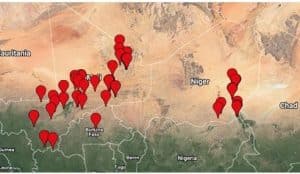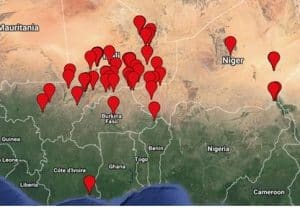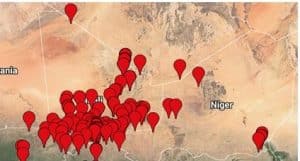African Union Warns IS Foreign Fighters Headed to Africa
December 17, 2017 in Africa, al-Qaeda, IS, Islamic StateReports have emerged that up to 6,000 Africans who fought for the so-called Islamic State (IS) are making their way back to Africa after the group was forced out of territory previously held in Syria and Iraq. The threat posed by IS militants was raised on 11 December 2017 during a meeting on counter-terrorism organized by the African Union (AU) and Algeria. The AU’s top security official called on regional countries to prepare. The report comes as the G5 Sahel is launching operations in the West African region amidst an increase in terrorist activity in the past year.
Smaïl Chergui, the AU’s commissioner for peace and security, told the meeting “there are reports of 6,000 African fighters among the 30,000 foreign elements who joined this terrorist group in the Middle East.” He warned that African countries will need to work closely with one another to share intelligence in order to counter returning militants.
After IS seized vast swathes of Iraq and Syria in 2014, tens of thousands of foreigners joined the terrorist group. However, in the last year, IS has suffered a string of losses to both its territory and military capabilities. Earlier this month, Iraq declared that the country was had been liberated from IS’ control. In Syria, the terrorist group remains under pressure. The squeeze on IS in Iraq and Syria has sparked concerns that its remaining foreign fighters will return home to spread their ideology or conduct extremist actions.
Africa’s Fragile Security Situation
Africa’s security situation remains fragile as a number of countries are battling insurgencies led by major terrorist groups with links to al-Qaeda and IS. Continued insecurity in Libya and Mali, along with insurgencies in Somalia and Nigeria, have transformed areas of the continent into breeding grounds for jihadi activity – resulting in regional instability. Fighters with weaponry are able to move with relative ease through the porous borders. These regional conflicts have also spilled across borders, and have begun to impact stable nations.
In Nigeria, Boko Haram’s nine-year insurgency has continued, despite the Nigerian government’s announcements on numerous occasions that the terrorist group has been defeated. Although the number of attacks in the northeastern region of the country has significantly declined in the last year, and Boko Haram no longer controls major areas, suicide bombings continue to target mosques, markets and other soft targets. The Far North region of Cameroon and the southern Diffa region of Niger have been impacted by Boko Haram violence. In Somalia, al-Shabaab has remained active, and in October the group launched their deadliest attack – a truck bombing in the capital Mogadishu that killed over 500 people. The United States has carried out dozens of airstrikes targeting senior al-Shabaab commanders this year, however the central government in Mogadishu has minimal control outside the capital. Al-Shabaab has continued to launch attacks near the border regions with Kenya.
In West Africa, the continued situation in Mali has increasingly impacted security across the region. Fighting has spilled as terror groups launch attacks in Ivory Coast, Burkina Faso, and Niger. In 2015, at least 81 incidents of terrorism were reported in Burkina Faso, Mali, and Niger, with most incidents occurring in Mali. In 2016, this figure decreased slightly to 70 incidents, yet regional terrorist groups proved their operational capabilities by launching a major attack in Grand Bassam Ivory Coast in March of that year. In 2017, the number of terrorist incidents has nearly doubled from 2016, with at least 132 attacks reported as of 15 December. Furthermore, the northern Sahel region in Burkina Faso has seen a sharp rise in extremist activity this year, as terrorist groups operating in the area increasingly target local communities.
2015 – 81 Terrorist Incidents reported; most activity occurring in Mali
2016 – 70 terrorist incidents reported. While activity slightly declined, groups are becoming bolder, launching major attacks in countries not previously threatened by terrorism, like Ivory Coast
2017 – 132 incidents reported as of 15 December, with a major expansion of reported incidents in the southern region of Mali, northern area of Burkina Faso, and western Niger.
The African continent is now under increased threat from a battle between IS and al-Qaeda, as both terror groups seek to gain influence in the region. This battle has already begun; IS aims to find new territory after suffering major losses in Iraq and Syria, and al-Qaeda aims to secure its future on the African continent by expanding its operations into countries previously unaffected by terror, and forming alliances in the sub-Saharan region.
IS influence on the African continent has increased in recent years – Boko Haram has split, with one faction continuing under the al-Qaeda banner and another pledging allegiance to IS. Similarly in Somalia, a small group of IS fighters have emerged and launched attacks in the Puntland region, though officials have indicated that their influence remains minimal. Al-Qaeda has also sought to expand their influence, and have used Mali’s continued insecurity to their advantage. New groups have emerged along the southern Malian border with Burkina Faso and Niger. These groups have proven to be deadly as they have launched attacks on the local communities, kidnapping and killing locals as they attempt to spread their ideology.
While the G5 Sahel operation is a sign that West African leaders are aware of the threat posed by terrorist groups operating in the region, its impact remains to be seen as funding issues have impacted the operation.



